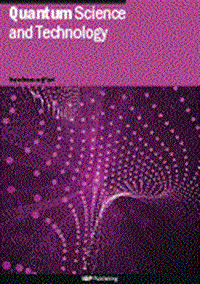基于光子数分辨探测器和介观双光束态的量子通信混合鉴别策略
IF 5
2区 物理与天体物理
Q1 PHYSICS, MULTIDISCIPLINARY
引用次数: 0
摘要
状态歧视是量子通信协议实现中的一个关键挑战。大多数光通信协议依赖于光的相干状态或脆弱的单光子状态,这使得同时实现鲁棒性和安全性往往很困难。在这项工作中,我们提出了一种在介观强度体系中运作的混合策略,利用光的鲁棒量子态。我们的方法结合了经典和量子特征:基于光的经典特性的可靠状态判别,以及源于非经典相关性的安全性。具体来说,接收器使用光子数分辨探测器获取编码信息的二进制热信号的平均光子数。通信信道利用双波束状态,固有的敏感窃听攻击,提供一层安全。这种策略是可扩展的,允许直接扩展到更复杂的信号字母表,并为介观强度域的鲁棒和安全量子通信提供了一条有前途的途径。本文章由计算机程序翻译,如有差异,请以英文原文为准。
Hybrid discrimination strategy in quantum communication based on photon-number-resolving detectors and mesoscopic twin-beam states
State discrimination is a key challenge in the implementation of quantum communication protocols. Most optical communication protocols rely on either coherent states of light or fragile single-photon states, making it often difficult to achieve robustness and security simultaneously. In this work, we propose a hybrid strategy that operates in the mesoscopic intensity regime, leveraging robust quantum states of light. Our approach combines classical and quantum features: reliable state discrimination based on a classical property of light, and security stemming from nonclassical correlations. Specifically, the receiver uses photon-number-resolving detectors to access the mean photon number of the binary thermal signals encoding the information. The communication channel exploits twin-beam states, inherently sensitive to eavesdropping attacks, to provide a layer of security. This strategy is scalable, allowing for straightforward extension to more complex signal alphabets, and offers a promising route for robust and secure quantum communication in the mesoscopic intensity domain.
求助全文
通过发布文献求助,成功后即可免费获取论文全文。
去求助
来源期刊

Quantum Science and Technology
Materials Science-Materials Science (miscellaneous)
CiteScore
11.20
自引率
3.00%
发文量
133
期刊介绍:
Driven by advances in technology and experimental capability, the last decade has seen the emergence of quantum technology: a new praxis for controlling the quantum world. It is now possible to engineer complex, multi-component systems that merge the once distinct fields of quantum optics and condensed matter physics.
Quantum Science and Technology is a new multidisciplinary, electronic-only journal, devoted to publishing research of the highest quality and impact covering theoretical and experimental advances in the fundamental science and application of all quantum-enabled technologies.
 求助内容:
求助内容: 应助结果提醒方式:
应助结果提醒方式:


